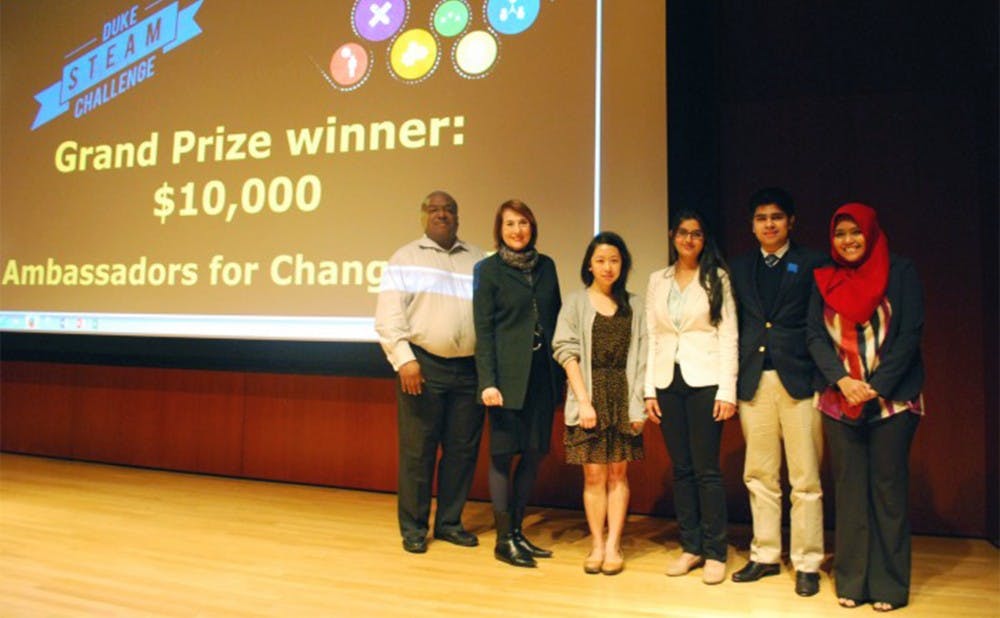The first annual Duke STEAM challenge prize was awarded to a group of four undergraduates working to curb dehydration caused by diarrhea in northern India.
The STEAM initiative calls upon undergraduate, graduate and professional students to create an interdisciplinary approach to problem solving by combining science, technology, engineering and math with the arts. This year’s winning team designed a program that implements puppetry as an educational tool to depict the benefits of oral rehydration therapy. At a judging Jan. 18 at the Nasher Museum of Art, the team was awarded a $10,000 prize.
The group’s members—sophomores Saffana Humaira, Suhani Jalota, Rebecca Lai and Kehaan Manjee—chose to tackle this global health issue after researching diarrhea’s detrimental effects on child health in Bihar, India. All of the members, except Lai, are international students from South Asia.
“People were either not aware of or simply not using oral rehydration therapy to treat diarrhea, even as thousands of children died each day due to the disease,” Jalota said.
Their initiative to combat dehydration focused on educating school-aged girls so they can pass the information down through family generations. The group tried to theorize a creative way to communicate their message to the target audience, as girls are more likely to play a larger family role, Humaira said.
“If we want people to listen to us, we need to adopt their methods of delivering information,” Jalota said. “Adolescent girls are more engaged with cartoons and visual representations.”
Jalota spent this year’s winter break working with schools in India to implement a trial run of her group’s educational puppet show. She collected feedback from local officials, teachers and students that her team used to perfect the design in time for the final judging.
The group plans to use the prize money to implement a six-week pilot program for the Bihar project, Lai said. They will start by hiring local schoolteachers to put on the puppet show until the first class of graduating girls can take over the initiative themselves.
“We plan to collaborate with Duke faculty and other Duke resources for advice and also present our project in conferences like Clinton Global Initiative and other global health case competitions to find more support,” Humaira added.
The team’s win is also being seen as a victory for interdisciplinary education at Duke.
“The old-fashioned distinction between science and technology, on the one hand, and the human, ethical, social, cultural and aesthetic dimensions of technology just doesn’t hold any more, if ever it did,” explained Cathy Davidson, John Hope Franklin Humanities Institute professor of interdisciplinary studies and STEAM Challenge co-leader. “In the STEAM Challenge, Duke students led the way to make many new pathways across these divisions in the curriculum.”
Manjee also saw the challenge as an opportunity to bridge the gaps between students in the Trinity School of Arts and Sciences and the Pratt School of Engineering in order to create a unique project that combines principles from multiple academic arenas.
“We as a team truly believed that any real-world problem requires a multi-disciplinary approach for a truly sustainable solution,” Humaira said.
Get The Chronicle straight to your inbox
Sign up for our weekly newsletter. Cancel at any time.

